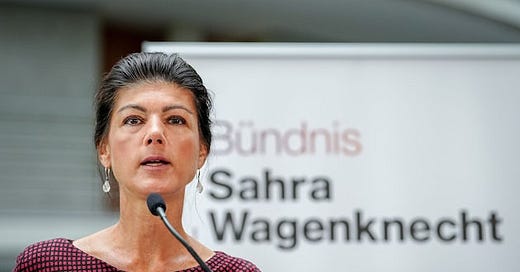Sahra Wagenknecht is a thread to German Democracy
Amid coming coalition talks in three East German States Wagenknecht shows that Russian Propaganda is more important to her than actually governing for the people.
Photo: Kay Nietfeld/dpa
It’s getting serious for the Alliance Sahra Wagenknecht (BSW) as her party is participating in coalition talks in East German States. The first exploratory talks in Brandenburg and Thuringia already have a resulting paper in which goals and first measurements are written down for the actual coalition negotiations. In Brandenburg the BSW actually managed to pressure the SPD into positioning itself against the delivery of weapons to Ukraine. The paper also sees the planned deployment of US missiles in Germany critical.
Yet in Thuringia the BSW did not manage to bring out a clear positioning against the delivery of weapons or the deployment of US missiles. Still the paper brings out many other BSW positions such as more investments in education, harsher migration policies or the support and improvements in health and elderly care. As it is basically impossible to have any say in foreign policy on a regional level it should not be a surprise that the BSW-Thuringia maybe priorised topics where they could actually make a change.
Now the board of the BSW came out with a resolution basically stating that the BSW-Thuringia shouldn’t participate in the coalition if there is no clear statement like there is in Brandenburg. First of all is it more than questionable that the federal party board plays such a big role in state-level coalition talks. The German Party System is designed in a way that ensures autonomy to the state associations of the parties. Yet Sahra Wagenknecht, chairwoman of the BSW, does everything in her power to bring foreign policy into state-level policies. She sets her priorities straight: The election campaign for the Bundestagswahl 2025. Wagenknecht fears that a slight drift of her party in Kremlin-friendly positions (even if its just on state level) could hurt her campaign next year. While she expects CDU & SPD to deviate from their Westbindung (west bond) she does not want to move an inch in her Ukraine policies - no weapons to the Ukraine and peace negotiations, even if the peace is an imposed peace by Russia.
If the BSW in Thuringia would actually opt out of a coalition then the state would be in a state of disaster. The CDU would then have to talk to the left, which by party resolution is forbidden, or there would have to be new elections, which seems more likely. New elections would certainly help the AfD and probably also BSW but would most definitely not help the future of the state and the already heavily damaged trust into democracy and its institutions.
Wagenknecht and Autocracies - (not so) secret love
Wagenknecht always had a preference for autocratic regimes. After the reunification of Germany young Wagenknecht wanted to turn backwards instead of forwards. While the newly formed Party of Democratic Socialism (PDS) tried to loosen itself from its German Democratic Republic (DDR) past and implement an image of democratic legitimacy, Wagenknecht became popular with positive statements towards Stalin and the Soviet Dictatorships. Inside the PDS and the later new formed The Left she famously was part of the Communistic Platform from 1991 until 2010 which is and has always been left-extrem and anti constitutional. Still in 2008 she thought that the term “dictatorship” was inappropriate for the DDR. And don’t forget: In 2008 she wasn’t “young and politically immature” - she was 39 years old and in politics for almost 20 years. These views were and probably partly still are deeply imbedded in her world view.
Nowadays this view on the world and liberal democracy is displayed heavily in her policies towards Russia. While she officially condemns Putin’s war against the Ukraine, she still blames the West for provoking this war. That the Ukraine wanted and still wants to turn westwards would be a obvious provocation. Wagenknecht’s seems to forget that also the Ukraine is a free country which is allowed to make its own choices. She wants to legitimate that Putin and Russia do not care about International Law and normalise the relationship to the Russian Dictatorship.
Now add her populist rhetoric and you get the image of someone who wants to spread mistrust in Democracy and its institutions. Wagenknecht describes the Greens as the most dangerous party in Germany while we are having a literal Nazi-Party as the strongest party in Thuringia. She reminisces about a authoritarian German past in which her ideology was still being valued. She does not like and value our liberal democracy and wants to go back to the days of the DDR with a tight relationship to Russia.
Wagenknecht also seems to forget that Germany has been on a peace path with Russia the last 30 years. Since the fall of the USSR Germany has done everything to remain a good relationship with Russia despite of various reasons not to. Even after the Invasion of Georgia and the Annexation of Crimea Germany still held on to the plans of Nordstream 2. Still did our Government not ever think that we can not rely our cheap energy on a Russian dictatorship. And still did Putin invade Ukraine. How possibly should we as a country now be able to keep a good relationship with Russia after everything that we have done and everything that Putin has done. Putin is a crazy authoritarian warmonger - nothing else - and we as a society can not ever normalise him and his actions.




